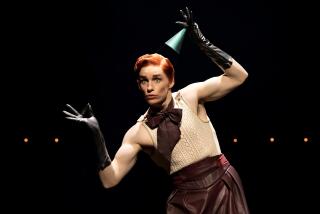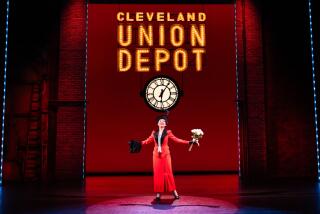Broadway’s fall revivals: Why big stars can’t make up for a lack of artistic vision
In a Broadway season heavy on revivals, shows from another era have been given starry makeovers. But everything old isn’t new again. Classics aren’t created by crowded marquees. Plays and musicals written for an earlier age can be long savored, but let’s not kid ourselves into thinking the work is for all time.
A new revival at the Broadhurst Theatre of “The Front Page,” the Ben Hecht and Charles MacArthur comedy that has been adapted once too often for the screen, has the Broadway cast equivalent of the Hollywood crew of “It’s a Mad, Mad, Mad, Mad World.” Two-time Tony winner Nathan Lane heads a top-drawer company that includes John Goodman, John Slattery, Jefferson Mays, Sherie Rene Scott and Holland Taylor.
Everywhere you turn there’s a stage luminary. (Look, there’s Robert Morse!) All these familiar faces provide a welcome distraction from the reality that this three-act farce (performed with two intermissions) is a big snore.
The first act, which should be drastically reduced for future productions, is all dawdling exposition. There’s so much time wasted setting up the play — which takes place in the press room of the Criminal Courts Building in gangster-ridden, late 1920s Chicago — that when the plot finally kicks into high gear, it feels like a 400-meter dash after a marathon.
A screwball comedy about ink-stained wretches, “The Front Page” dramatizes the mad scramble of reporters to cover a breaking story about an escaped criminal hotly pursued by bunglers in law enforcement and city government desperate to cover their tails.
Slattery plays Hildy Johnson, a star at the Herald-Examiner, who’s about to hop a train with his bride-to-be for a more respectable life in New York, when the scoop of a lifetime jumps through the window, forcing him to postpone his plans and conceal the escaped prisoner inside a rolling desk until the full stranger-than-fiction story can be brandished on his newspaper’s front page.
Director Jack O’Brien, who won Tony Awards for his direction of Shakespeare’s “Henry IV,” Tom Stoppard’s “The Coast of Utopia” and the musical “Hairspray,” is usually an adroit hand with large casts. But he is unable here to thread his actors into a credible ensemble.
The period acting gives us fakery without much style. Goodman, who plays Sheriff Hartman, puts on a festival of mugging — his eyes apoplectically bulging, his pants being hoisted over his girth as a comedic exclamation point.
Lane’s brilliance as Walter Burns, the fiendishly unscrupulous editor who’s determined to keep Hildy at the paper, almost redeems the production. But the character arrives only toward the end of the second act. The whiplash snap of Lane’s timing and his habit of italicizing a word in a fury of frustration are like smelling salts for the audience. But the theatrical rescue has come too late. This most popular of newspaper comedies is a relic of a bygone media age.
Not many were hankering for a big Broadway revival of “Les Liaisons Dangereuses,” as far as I can make out. But the Donmar Warehouse production at the Booth Theatre of Christopher Hampton’s 1985 play (based on the novel by Choderlos de Laclos) came with sterling London reviews and the formidable English actress Janet McTeer, whose Tony-winning portrayal of Nora in Ibsen’s “A Doll’s House” remains one of my top five theatergoing experiences of all time.
Heightening interest was the casting of Liev Schreiber, star of the Showtime series “Ray Donovan” and a superb Shakespearean player with a Tony-winning performance in David Mamet’s “Glengarry Glen Ross” under his belt. With his rakish way with words, Schreiber seemed on paper like an ideal complement to McTeer in Josie Rourke’s New York production. (Dominic West starred opposite McTeer in London.)
But the chemistry between the leads is surprisingly inert. The characters of Le Marquise de Merteuil and Le Vicomte de Valmont, the romantic schemers who toy with the affections of everyone around them in their chess match to conceal their love for each other, have an impressive lineage. Lindsay Duncan and Alan Rickman originated the roles in Britain before making their legendary Broadway debuts in the parts; Glenn Close and John Malkovich played the amorous connivers with diabolic relish in Stephen Frears’ 1988 film adaptation, “Dangerous Liaisons.”
Physically, the tall, galloping McTeer and the solidly built Schreiber should blend but don’t. (Tom Scutt’s costumes for Schreiber don’t do the actor any favors.) If the sexual attraction between the characters is still alive, they are doing a perfect job of hiding it.
There’s something almost depressive about Schreiber’s Valmont. He takes the opposite tack of Malkovich, who seemed to relish the sensual game playing even as the decadent power struggle clearly imposes a heavy toll on him. The sexual tinge of the French word “jouissance,” which in English is defined more banally as “enjoyment,” is missing from Schreiber’s performance. His seductive forays into the lives of Cécile Volanges (Elena Kampouris) and Madame de Tourvel (Birgitte Hjort Sorensen) appear to be motivated more by a quizzical “Hamlet”-like sadness than by any libidinous aristocratic intrigue.
Perhaps Schreiber sees the secret of Valmont’s bedroom success in his charade of authentic heartache. But an alacrity is missing from Rourke’s production, which unfolds on a gorgeously dilapidated set by Scutt that flickers in the candlelight magic of lighting designer Mark Henderson. The combination of Louis XIV splendor and Samuel Beckett apocalypse is arresting, but no amount of scenic legerdemain can mask a leaden revival.
“Falsettos,” the AIDS musical by William Finn and James Lapine (who directs this new Lincoln Center Theater production at the Walter Kerr Theater) is composed of two one-acts, “March of the Falsettos” (1981) and “Falsettoland” (1990), that had their Broadway debut as single show in 1992.
A snapshot of gay life both before AIDS started making headlines and after it went on its deadly rampage, the show revolves around Marvin (Christian Borle), a center-of-the-universe type of guy who has fallen in love with a man, Whizzer (Andrew Rannells), while married to a woman, Trina (Stephanie J. Block). Determined to have his cake and eat it too, Marvin wants to unify his family and new lover with a sentiment that’s at once contrite and arrogant — and not quite equal to the emotional mess that’s been created.
Trina sees Marvin’s psychiatrist, Mendel (Brandon Uranowitz), to work through her feelings so that (as Marvin hopes) a more harmonious arrangement with their son, Jason (Anthony Rosenthal), can be arranged. But something unexpected happens: Mendel falls madly in love with Trina, further entangling this skein of classic New York neurotics.
The first half of “Falsettos” focuses on the tangle of Marvin’s relationships. Whizzer isn’t as docile as Trina, Trina isn’t as forgiving as narcissistic Marvin would like, Mendel is besotted with Trina and only Jason seems to have any sanity about him. Finn’s music, a compendium of 1970s Broadway, relates the show’s harried psychology with a fitful ebullience that’s darkened with observant ironies.
Stephen Sondheim’s “Company” looms large, with “Pippin” and other of the decade’s box office hits detectable in the score’s commercial emollient. The opening number, “Four Jews in a Room Bitching,” is both funny and pandering. “Falsettos” tries too hard at times to win the audience over, but this sung-through musical’s chief problem is that it’s derivative — Sondheim giveth and Sondheim taketh away.
The second half, in which Whizzer, who dropped out of Marvin’s life in the intervening years, returns and promptly falls ill, has a lot more dramatic heft and originality. Two other characters, Dr. Charlotte (Tracie Thoms) and her girlfriend, Cordelia (Betsy Wolfe), round out the movingly makeshift family giving strength to Marvin and Whizzer as the unnamed disease renders all the old grudges trivial.
SIGN UP for the free Essential Arts & Culture newsletter »
“Falsettos” is a landmark work that yields as many laughs as tears, but it’s not to my mind one of the great American musicals. The polished production by Lapine, who co-wrote the book with Finn and who has more than 35 years experience in staging the material, however, makes it easy to pretend otherwise.
Borle’s Marvin and Rannells’ Whizzer may not be ideally suited for each other, but they are such winning performers (Borle balances prickliness with cocky charm and Rannells is the most lovable wiseacre on Broadway today) that it hardly matters that you don’t quite believe them as a couple.
Block makes the most of her musical nervous breakdown in “Trina’s Song,” a number that could be the sequel to “Getting Married Today” from “Company.” “Making a Home” is the most fully Sondheim of the songs, a lilting meditation on the difficulty of building a shareable life. Rosenthal’s adorably precocious Jason and Uranowitz’s affectionately confounded Mendel have us rooting for unconventional domestic success.
If the second act doesn’t have as many standout numbers, it’s probably because the show has us in a high state of anxiety about Whizzer’s fate. The songs seem to become less prominent as comedy turns to tragedy, though the music still informs every emotionally bracing moment.
“Falsettos” has become one of the deservedly hot tickets of the fall season, but like “The Front Page” and “Les Liaisons Dangereuses,” it seems very much a stroll through yesterday. The history is important but so too is an artistic reckoning with how the work does (or doesn’t) speak to us today.
Critics have long been complaining about the trend of remounting well-worn plays with Hollywood stars and not much vision. But this season, which includes the Roundabout Theatre Company’s roundly panned revival of “The Cherry Orchard” with Diane Lane, makes clear that even serious thespians are no guarantee of excellence. Names and talents have to be wielded for a greater purpose than successful recycling.
The excitement around the theater district has shifted to two original musicals, “Natasha, Pierre & The Great Comet of 1812,” in which Josh Groban is making a highly lauded Broadway debut, and “Dear Evan Hansen,” which opens next month after winning over New York critics during its off-Broadway run at Second Stage Theatre last spring. This harvest of revivals has only whetted the appetite for new crops.
Follow me @charlesmcnulty
ALSO
‘Miss You Like Hell,’ an immigration musical for the new Trump era
Who are these Trump voters? For a thoughtful portrait, turn to playwright Lynn Nottage’s ‘Sweat’
More to Read
The biggest entertainment stories
Get our big stories about Hollywood, film, television, music, arts, culture and more right in your inbox as soon as they publish.
You may occasionally receive promotional content from the Los Angeles Times.







